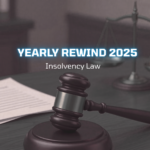Introduction
The Insolvency and Bankruptcy Code, 2016 (Code) aimed to bring a paradigm shift in the insolvency and bankruptcy laws in India by making it more creditor friendly and by facilitating the revival of financially distressed companies. The architects of the Code pre-empted the possibility of misuse of the Code to fraudulently initiate insolvency / liquidation proceedings by incorporating section 65 of the Code. Section 65 sanctions such persons who invoke the provisions of the Code for fraudulent purposes and imposes a penalty of up to INR ten million.
Section 65 applies where the insolvency / liquidation process has been ‘initiated’ with a fraudulent or malicious intent. The use of the term ‘initiates’ under Section 65 has created uncertainty on whether the provision will apply where an application seeking initiation of insolvency / liquidation process has been filed before the National Company Law Tribunal (NCLT) but is still pending admission.
In its recent decision in Ashmeet Singh Bhatia v. Sundrm Consultants Pvt. Ltd. and Anr. (Sundrm Consultants Case), the National Company Law Appellate Tribunal (NCLAT) has clarified this issue.
Brief Facts
Sundrm Consultants Pvt. Ltd. (Sundrm Consultants) filed an application (Insolvency Application) to initiate corporate insolvency resolution process (CIRP) of Three C Properties Pvt. Ltd. (Corporate Debtor), which was pending adjudication before NCLT. Meanwhile, a homebuyer in one of the companies of the Corporate Debtor, filed an application before the NCLT praying for dismissal of the Insolvency Application on the grounds that it was filed with a malicious intent to defraud several homebuyers.
The NCLT dismissed this application by holding that an application under Section 65 can be filed only once the CIRP is ‘initiated’, and not prior to the admission of the Insolvency Application.. The NCLT’s order was challenged before the NCLAT.
NCLAT’s Ruling
The NCLAT noted that the Code differentiates between ‘initiation date’ and ‘insolvency commencement date’. While ‘initiation date’[i] means the date on which an application is filed before the NCLT for initiating CIRP, ‘insolvency commencement date’[ii] means the date of admission of the said application. Taking into consideration the aforementioned definitions and relying on precedents[iii], the NCLAT held that the ‘initiation’ would mean filing of the application with the NCLT for the initiation of CIRP process. Accordingly, the NCLAT ruled that an application under Section 65 is maintainable when an application seeking initiation of insolvency / liquidation process has been filed before the NCLT but is still pending admission. The NCLAT set aside the NCLT’s order and directed that the NCLT to reconsider the homebuyer’s application on merits.
Our Thoughts
The ruling in the Sundrm Consultants Case has provided much-needed clarity on the initiation of CIRP and the applicability of Section 65. The decision emphasises the importance of preventing fraudulent initiation of insolvency proceedings, as such fraudulent actions, not only impact the creditors adversely but also questions the credibility of the entire insolvency resolution process. The NCLAT’s decision in this case is a positive step towards discouraging creditors with mala fide intent from misusing the Code to defeat the rights of the genuine creditors.
The information contained in this document is not legal advice or legal opinion. The contents recorded in the said document are for informational purposes only and should not be used for commercial purposes. Acuity Law LLP disclaims all liability to any person for any loss or damage caused by errors or omissions, whether arising from negligence, accident, or any other cause.
[i] Section 5(11) of the Code
[ii] Section 5(12) of the Code
[iii] Ramesh Kymal v. Siemens Gamesa Renewable Power Pvt. Ltd. [(2021) 3 SCC 224]




